| Phillips Academy Academia Phillipiana[1] | |
|---|---|
 | |
| Address | |
180 Main Street , Massachusetts 01810 United States | |
| Coordinates | 42°38′50″N 71°07′54″W / 42.6473°N 71.1316°W |
| Information | |
| School type | |
| Motto | |
| Established |
|
| Founder | Samuel Phillips Jr. |
| CEEB code | 220030 |
| NCES School ID | 00603199 |
| President | Amy Falls |
| Head of School | Raynard S. Kington[2] |
| Teaching staff | 213.6 (2017–18)[3] |
| Grades | 9–12,[3] PG |
| Gender | Coeducational |
| Enrollment | 1,131 (2017-18)[3] |
| • Grade 9 | 228 |
| • Grade 10 | 300 |
| • Grade 11 | 284 |
| • Grade 12 | 319 |
| • Boarding Students | 848 |
| • Day Students | 282 |
| Student to teacher ratio | 5.3:1 (2017–18)[3] |
| Campus size | 706 acres (3 km2) |
| Campus type | Suburban |
| Color(s) |
|
| Athletics conference | |
| Mascot | Gunga, the gorilla |
| Team name | Big Blue |
| Rival | Phillips Exeter Academy |
| Accreditation |
|
| Newspaper | The Phillipian |
| Yearbook | Pot Pourri |
| Endowment | |
| Budget | $138 million (2019)[5] |
| Tuition | $69,600 (boarding)[6] $53,950 (day)[6] |
| Affiliations |
|
| Former pupils | Old Phillipians |
| Website | andover |
Phillips Academy (also known as PA, Phillips Academy Andover, or simply Andover) is a co-educational university-preparatory school for boarding and day students in grades 9–12, along with a post-graduate year. The school is in Andover, Massachusetts, United States, 25 miles north of Boston. Phillips Academy has 1,131 students,[8] and is highly selective, accepting 9% for the 2022–2023 school year.[9] It is part of the Eight Schools Association and the Ten Schools Admissions Organization.
Founded in 1778, Andover is one of the oldest incorporated secondary schools in the United States. It has educated a long list of notable alumni through its history, including American presidents George H. W. Bush and George W. Bush, foreign heads of state, numerous members of Congress, five Nobel laureates and six Medal of Honor recipients.[10]
It became coeducational in 1973, the year in which it merged with its neighbor girls' school Abbot Academy.[11]
Overview
Phillips Academy is the oldest incorporated academy in the United States,[12] established in 1778 by Samuel Phillips Jr. His uncle, Dr. John Phillips, later founded Phillips Exeter Academy in 1781. Phillips Academy's endowment stood at just over one billion dollars as of February 2016.[13] Andover is subject to the control of a board of trustees.[14][15] Raynard S. Kington has been the Head of School since 2019.[16]
Phillips Academy admitted only boys until 1973, when it merged with Abbot Academy, a boarding school for girls also in Andover. Abbot Academy, founded in 1828,[11] was one of the first incorporated schools for girls in New England.
Andover traditionally educated its students for later studies at Yale University.[17]
The school's student-run newspaper, The Phillipian,[18] is the oldest secondary school newspaper in the United States, the next oldest secondary school newspaper being The Exonian, Phillips Exeter Academy's weekly.[19] The Phillipian was first published on July 28, 1857, and is said to have been published regularly since 1878. Students comprise the editorial board and make all decisions for the paper, consulting with faculty advisors at their own discretion. The Philomathean Society is one of the oldest high school debate societies in the nation, second to the Daniel Webster Debate Society at Phillips Exeter Academy.[20]
The Phillips Academy Poll, a public opinion research institute based at Phillips Academy, attained national prominence in 2021 while being featured in major media outlets. It is the first public opinion poll to be conducted by high school students.[21]
Phillips Academy also runs a five-week summer session for approximately 600 students entering grades 8 through 12.[22]
History

Several figures from the revolutionary period are associated with the school. George Washington visited the school during his presidency in 1789,[23] and Washington's nephews later attended the school. John Hancock signed the school's articles of incorporation and the great seal of the school was designed by Paul Revere.

Phillips Academy's traditional rival is Phillips Exeter Academy, which was established three years later in Exeter, New Hampshire, by Samuel Phillips' uncle, John Phillips. The rivalry persists. The football teams have met nearly every year since 1878, making it the oldest prep school rivalry in the country.[24]
For a hundred years of its history, Phillips Academy shared its campus with the Andover Theological Seminary, which was founded on Phillips Hill in 1807 by orthodox Calvinists who had fled Harvard College after it appointed a liberal Unitarian theology professor. The seminary was independent of Phillips Academy but shared the same board of directors. In 1908, the seminary departed Phillips Academy, leaving behind its key buildings: academic building Pearson Hall (formerly a chapel), and dormitories Foxcroft Hall and Bartlet Hall.[25] These buildings later became part of the Andover campus, which was expanded in the 1920s and 1930s around this historic core with new buildings of similar Georgian style, including Paresky Commons and the Addison Gallery of American Art.[26] Small portions of Andover's campus were laid out by Frederick Law Olmsted, designer of Central Park and himself a graduate of the school.[27]
Revere's design of the school's seal incorporated bees, a beehive, and the sun. The school's primary motto, Non Sibi, located in the sun, means "not for oneself." The school's second motto, Finis Origine Pendet, meaning "the end depends upon the beginning," is scrolled across the bottom of the seal.[28]
Phillips was one of the schools where students on the Chinese Educational Mission were sent to study by the Qing dynasty government from 1878 to 1881. One of the students, Liang Cheng, later became the Chinese ambassador to the United States.[29]
During the 1930s the school was involved in the International Schoolboy Fellowship, a cultural exchange program between US academies, British public schools and Nazi boarding schools.[30]

Phillips Academy curriculum and extracurricular activities include music ensembles, thirty competitive sports, a campus newspaper, a radio station, and a debate club. In 1973 Phillips Academy merged with neighboring Abbot Academy, which was founded in 1829 as one of the first schools for girls in New England.[31] After existing at Phillips Academy almost since its inception, secret societies were officially disbanded in 1949. One secret society continues to exist.[32][33][34]
Phillips Academy is one of only a few private high schools (others include Roxbury Latin and St. Andrew's School) in the United States that attained need-blind admissions in 2007 and 2008, and it has continued this policy through the present.[35] In 2013 it received 3,029 applications and accepted 13%, a record low acceptance rate for the school. Of those accepted, 79% went on to matriculate at the academy.[36]
Academics
Phillips Academy follows a trimester program, where a school year is divided into three terms, with each term lasting approximately ten weeks.[37] Many courses are year-long, while others last only one to two terms.[38] Students may also choose to pursue an independent research program in a topic of choice under the guidance of faculty members if there are no more courses suitable for them in one or more disciplines.
Andover does not rank students, and rather than a four-point GPA scale, Phillips Academy calculates GPA using a six-point system. A six is considered outstanding and is (theoretically) rarely awarded, a five is the lowest honors grade, and a two is the lowest passing grade.[39]
In 1952, Andover, Exeter, Lawrenceville, Harvard, Princeton and Yale published the study General Education in School and College: A Committee Report. The report recommended examinations that would place students after admission to college. This program evolved into the Advanced Placement Program.[40][41]
For the 239 members of the class of 2018, average SAT scores were 720 on the English section and 740 on the Math section.[42]
Facilities
Notable academic facilities
- Bulfinch Hall was designed by Asher Benjamin, a student of architect Charles Bulfinch, and built in 1819. It now houses the English Department and received renovations during the summer and fall terms of 2012.[43]
- The Gelb Science Center, named after alumnus donor Richard L. Gelb, opened for classes in January 2004. It replaced the older Evans Hall, which was built in 1963 and demolished following the completion of Gelb. Gelb has three floors, each devoted to a separate science. The first-floor houses biology, the second-floor physics, and the third-floor chemistry. Gelb also has an observatory above the third floor.[44]
 Gelb Science center.
Gelb Science center. - Morse Hall is used by the Math Department, CAMD (Community and Multicultural Development), the student-run radio station (WPAA), and some of the student-run publications. Morse Hall is named after Samuel Morse, who graduated from Phillips Academy in 1805 and later invented the telegraph and Morse code.

- Oliver Wendell Holmes Library (OWHL) was built in 1929 (renovated 1987 and 2018–2019) and is named after Oliver Wendell Holmes Sr., an 1825 graduate of Phillips Academy.[45] It is built in the Georgian Revival architectural style.[45] The library houses more than 120,000 works. Located in OWHL is the Garver Room, known to students as "Silent Study."[46] The Garver Room containing the most comprehensive secondary-school reference collection in the country.[47] In 2019, the OWHL received the Internet Archive's "Hero Award."[48] Over 50 classes make use of The Nest as a teaching facility.[49]
- Pearson Hall, one of the oldest structures on campus, is the classics building. It was built in 1817.[50]
Student facilities
- Cochran Chapel is a neo-Georgian church located on the north side of campus. It is also home to the philosophy, religious studies, and community service departments.
- Paresky Commons is the school's dining hall.
- George Washington Hall was built in 1926 and has since undergone many additions and renovations. The building serves numerous functions, including as an administration building (Head of School's office, dean of studies, dean of students, among others), a post office (a mail room), and the Day Student Lounge and locker area. The hall also houses the drama and arts departments.
- The Log Cabin is located in the 65-acre (0.26 km2) Cochran Wildlife Sanctuary on the northeastern edge of campus and serves as a place for student groups to hold meetings as well as sleep-overs.
- Rebecca M. Sykes Wellness Center houses both physical and mental health facilities for students.
- The Snyder Center is a 98,000 square-foot space, housing athletic facilities for students, including squash courts and an indoor track.[51]
- The Pan Athletic Center is a 70,000-square-foot athletic facility for students completed in September 2022, including a swimming and diving complex and dance studios.[52]

The school also has dormitories to house the roughly 800 students that board. These buildings range in size from housing as few as four to as many as 40 students. The campus is organized into five "clusters," groups of dorms situated closely together. These five clusters are named Abbot, Flagstaff, Pine Knoll, West Quad North, and West Quad South.[53] Each cluster contains around 220 students, 40 faculty families, and a cluster dean and are responsible for organizing social events, orientation, study breaks, and munches (cluster-wide snacking social events).[22]
Two notable dorms are America House, where the song America was penned,[54] and Stowe House, where American writer Harriet Beecher Stowe (author of Uncle Tom's Cabin) lived while her husband taught at the Andover Theological Seminary.[54] None of the original buildings remain; the oldest dorm is Blanchard House, built in 1789. Several dorms are named after prominent alumni, such as Henry L. Stimson, Secretary of War during World War II, and men instrumental in the founding of the academy, such as Nathan Hale and Paul Revere. Also located on campus is The Andover Inn. Built in 1930, The Andover Inn is a New England country inn with 30 rooms and meeting space.
Museums
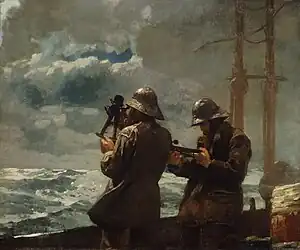
The Addison Gallery of American Art is an art museum given to the school by alumnus Thomas Cochran in memory of his friend Keturah Addison Cobb.[55] Its permanent collection includes Winslow Homer's Eight Bells, along with work by John Singleton Copley, Benjamin West, Thomas Eakins, James McNeill Whistler, Frederic Remington, George Bellows, Edward Hopper, Georgia O'Keeffe, Jackson Pollock, Frank Stella, and Andrew Wyeth. The museum also features collections in American photography and decorative arts, with silver and furniture dating back to precolonial America and a collection of colonial model ships. A rotating schedule of exhibitions is open to students and the public alike. In the spring of 2006, the Phillips Academy Board of Trustees approved a $30-million campaign to renovate and expand the Addison Gallery.[56] Construction on the Addison began in the middle of 2008 and, as of September 7, 2010, is complete, and the museum is once again open to the Phillips Academy community and the broader community of the town of Andover.[57]
The Robert S. Peabody Institute of Archaeology was founded in 1901 and is now "one of the nation's major repositories of Native American archaeological collections".[58] The collection includes materials from the Northeast, Southeast, Midwest, Southwest, Mexico and the Arctic, and range from Paleo Indian (more than 10,000 years ago) to the present day. Since the early 1990s, the museum has been at the forefront of compliance with the Native American Graves Protection and Repatriation Act. It currently serves as an educational museum for the students of Phillips Academy. Still, it is accessible to researchers, public schools, and visitors by appointment.

Athletics
History
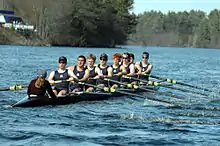
Athletic competition has long been a part of the Phillips Academy tradition. As early as 1805, football was being played on school grounds, according to a letter that Henry Pearson wrote his father, Eliphalet Pearson in 1805, saying, "I cannot write a long letter as I am very tired after having played at football all this afternoon."[59] The first ever interscholastic football game between high schools was in 1875, when Phillips Academy played against Adams Academy.[60]
Today, Phillips Academy is an athletic powerhouse among New England private schools. Since the Constitution of the Phillips Academy Athletic Association was drawn up in 1903 with the objective of "Athletics for All,"[61] Andover has established 29 different interscholastic programs, and 44 intramural or instructional programs, including fencing, tai chi, figure skating, and yoga. Andover Athletes have been successful in winning over 110 New England Championships in these different sports over the last three decades alone, and have even had the chance to compete abroad, in such competitions as the Henley Royal Regatta in Henley, England, for crew.[62]
The athletic directors of Andover and the other members of the Eight Schools Association (ESA) compose the Eight Schools Athletic Council, which organizes sports events and tournaments among ESA schools.[63][64][65] Andover is also a member of the New England Preparatory School Athletic Council.

Sports
A variety of sports are offered:[66]
Fall athletic offerings
- Crew (instructional)
- Cross country
- Dance (Ballet, Modern, Hip-Hop; Beg–Adv levels)
- Fencing (instructional)
- Field hockey
- Skating (instructional)
- FIT (Fundamentals In Training)
- Football
- Gunga FIT ("extreme" version of FIT)
- Outdoor Pursuits (S&R)
- Pilates
- SLAM (instructional [cheerleading])
- Soccer
- Soccer (intramural)
- Squash (instructional)
- Swimming (instructional)
- Tennis (instructional)
- Volleyball (girls')
- Volleyball (instructional)
- Water polo (boys')
- Yoga
- Zumba
Winter athletic offerings
- Basketball
- Basketball (intramural)
- Dance (Ballet, Modern, Hip-Hop; Beg–Adv levels)
- FIT (Fundamentals In Training)
- Gunga FIT ("extreme" version of FIT)
- Hockey
- Hockey (intramural)
- Indoor cycling (instructional/cycling pre-season)
- Indoor track
- Junior Basketball (intramural)
- Nordic skiing
- Outdoor Pursuits (S&R)
- Recreational cross-country skiing
- SLAM (Spirit Leaders [cheerleading])
- Squash
- Squash (intramural)
- Swimming and diving
- Wrestling
- Yoga
- Zumba
Spring athletic offerings
- Baseball
- Crew
- Cycling
- Dance (Ballet, Modern, Hip-Hop; Beg–Adv levels)
- Fencing (instructional)
- FIT (Fundamentals In Training)
- Golf
- Gunga FIT ("extreme" version of FIT)
- Lacrosse
- Outdoor Pursuits (S&R)
- Pilates
- Softball
- Squash (instructional)
- Swimming (instructional)
- Tennis
- Tennis (intramural)
- Track
- Ultimate Frisbee
- Ultimate Frisbee (intramural)
- Volleyball (boys')
- Water polo (girls')
- Yoga
Student body
For the 2020–2021 school year, the Andover student body included students from 44 states/territories and 51 countries.[67] Self reported students of color comprise 41.9% of the student body (Asian 40.1%, Black 10.4%, Hispanic/Latino 9.4%, Native Hawaiian or Pacific Islander 1.2%, Indigenous Peoples of the Americas 2.3%). Self reported legacy students (defined as students that "have at least one immediate family member who is currently attending or has previously attended Andover.") account for 33.2% of the students.[68]
Andover has its own nomenclature for grade levels. Juniors are students in their first year, Lowers are in their second year, Uppers are in their third year, and Seniors are in their fourth year. Andover admits postgraduate students as well ("PGs").[69]
73.7 percent of Andover students live on campus in dorms or houses while day students from the surrounding communities make up the remaining 26.3 percent of the student body.[68]
The Phillipians boast a diverse political landscape, in the 2021 State of the Academy 36.1% identified as liberal, 13.2% as independent, 11.3% as conservative, 4.0% as communist, 3.2% as libertarian, 3.2% as socialist, 1.6% did not identify with the above, leaving 21.8% who were unsure as to their political affiliation.[68]
Tuition and financial aid
For the 2021–2022 academic year, Phillips Academy charged boarding students $61,950 and day students $48,020.[70] In the 2018–2019 academic year, Phillips Academy charged boarding students $55,800 and day students $43,300, placing it among the most expensive boarding schools in the world.[71][72] Tuition has increased at a rate of 3.76% per year over the last decade.[70] Phillips Academy offers need-blind admission.[73] In the 2021–2022 academic year, 100% of demonstrated financial need was met with 47% of students receiving some form of financial aid and 15% of students receiving full scholarships. Returning students receive an average grant of $40,800.
| Year | Boarding Tuition | Day Student Tuition | Year/Year Boarding Increase % |
|---|---|---|---|
| 2001–2002[tuition 1] | $26,900 | $20,900 | (?) |
| 2006–2007[tuition 2] | $35,250 | $27,450 | 6.82% |
| 2011–2012[tuition 3] | $42,350 | $32,850 | 2.54% |
| 2016–2017[tuition 4] | $52,100 | $40,500 | 3.58% |
| 2021-2022[70] | $61,950 | $48,020 | 3.50% |
| 2022-2023[74] | $66,290 | $51,380 | 7% |
| 2023-2024[70] | $69,600 | $53,950 | 5% |
Affiliations
Andover is a member of the Eight Schools Association, begun informally in 1973–74 and formalized in 2006. Andover was host to the annual meeting of EtSA in April 2008. It is also a member of the Ten Schools Admissions Organization, founded in 1956. There is a seven-school overlap of membership between the two groups.[75] In addition, Andover is a member of the G20 Schools group, an international organization of independent secondary schools.
Controversies
In 2013, Phillips Academy drew national attention for apparent bias against girls and women, as highlighted by a low number of girls in student leadership.[76]
Reports in 2016 and 2017 identified several former teachers who had engaged in inappropriate sexual contact with students in the past. The school hired an independent law firm to investigate allegations of misconduct, and the head of school, John Palfrey, and the head of the Board of Trustees, Peter Currie, sent an email to the school community that such transgressions must not recur.[77]
In 2020, an Instagram account, @blackatandover, began circulating stories from anonymous current and former Black-identifying students, many of whom detailed personal experiences with racism at Phillips Academy. Several anonymous individuals raised concerns about Phillips Academy's disciplinary system, including perceived racial disparities in outcomes, a perceived emphasis on punishment over restorative justice, and an apparent lack of due process in discipline procedure outlined by the student handbook. The @blackatandover account was reported on by The New York Times, prompting school officials to form an "Anti-Racism Task Force," which released a final report in March 2022.[78][79][80]
Notable alumni
.jpg.webp) President George H. W. Bush
President George H. W. Bush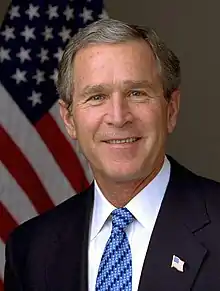 President George W. Bush
President George W. Bush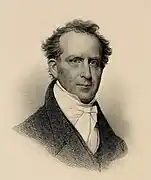

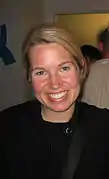
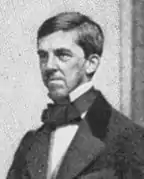
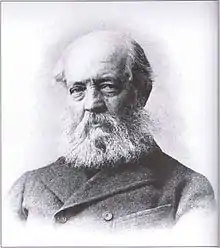
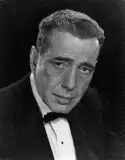



Andover has educated two American presidents (George H. W. Bush and George W. Bush), a Supreme Court Justice (William Henry Moody), six Medal of Honor recipients (Civil War: 2; Spanish–American War: 1; World War II: 2; Korean War: 1),[10] five Nobel laureates (making it one of only four secondary schools in the world to have educated five or more Nobel Prize winners), as well as winners of Tony, Grammy, Emmy and Academy Awards. Numerous graduates have become billionaires, including Tim Draper, venture capitalist; Ed Bass, philanthropist and environmentalist; Theodore J. Forstmann, founder of Forstmann Little & Company and IMG; and Lachlan Murdoch, CEO of the Fox Corporation.
Other notable alumni
- Alexander Trowbridge, U.S. Secretary of Commerce
- Benjamin Spock, pediatrician
- Bill Drayton, social entrepreneur
- Bill Veeck, owner of the Chicago White Sox and Cleveland Indians
- Buzz Bissinger, journalist
- Carl Andre, artist
- Julia Alvarez, writer
- Charles Ruff, White House Counsel to Bill Clinton[81]
- Chris Hughes, co-founder of Facebook
- Christopher Wray, Director of the Federal Bureau of Investigation
- David B. Birney, Union General during the Civil War
- David Graeber, anthropologist and activist
- Edgar Rice Burroughs, author known for creating Tarzan of the Apes and John Carter of Mars;
- Bill Belichick, coach for the New England Patriots and recipient of eight Super Bowl rings
- Humphrey Bogart, an Academy Award-winning actor considered to be one of the greatest stars of American cinema
- Elizabeth Stuart Phelps, an early feminist and social reformer
- Francis Cabot Lowell, instrumental figure in the American Industrial Revolution and namesake of Lowell, Massachusetts
- Frederick Law Olmsted, landscape architect known for designing Central Park and the Emerald Necklace
- George Church, geneticist
- Harlan Cleveland, U.S. Ambassador to NATO
- Heather Mac Donald, political commentator
- Henry L. Stimson, U.S. Secretary of State and Secretary of War
- Hiram Bingham III, Governor of Connecticut and U.S. Senator who rediscovered Machu Picchu
- Jack Lemmon, actor
- James Bell, U.S. Senator from New Hampshire
- Jeb Bush, former Governor of Florida, 2016 presidential candidate, and member of the Bush family
- Jigme Khesar Namgyel Wangchuck, King of Bhutan
- Philip K. Wrigley, chewing gum manufacturer
- John Berman, news anchor
- John Darnton, journalist
- Dana Delany, actress
- John F. Kennedy Jr., lawyer, journalist, and son of President John F. Kennedy
- Johnson N. Camden Jr., U.S. Senator from Kentucky
- Jonathan Alter, journalist for Newsweek and bestselling author
- Jonathan Dee, Pulitzer Prize-winning novelist
- Joseph Carter Abbott, U.S. Senator from South Carolina and colonel in the Civil War
- Joseph Cornell, influential avant-garde artist and filmmaker
- Josiah Quincy III, Mayor of Boston, President of Harvard University
- Karl Kirchwey, poet
- Katie Porter, U.S. Representative for California's 45th congressional district
- Lincoln Chafee, U.S. Senator and Governor of Rhode Island
- Lucy Danziger, editor-in-chief of Self
- Michael Beschloss, historian
- Norman Cahners, publisher
- Oliver Wendell Holmes Sr., writer
- Olivia Wilde, actress
- Patrick J. Kennedy, U.S. Representative for Rhode Island's 1st congressional district and member of the Kennedy family
- Peter Currie, CFO of Netscape
- Peter Halley, postmodernist painter and essayist central to the development of Neogeo (art) in 1980s New York
- Raymond C. Clevenger, Senior U.S. Circuit Judge of the U.S. Court of Appeals for the Federal Circuit
- Richard H. Brodhead, president of Duke University
- Richard Theodore Greener, first African-American graduate of Harvard
- Robert B. Stearns, co-founder of Bear Stearns
- Sara Nelson, editor-in-chief of Publishers Weekly
- Scooter Libby, political advisor during the Bush administration
- Seth Moulton, U.S. Representative for Massachusetts's 6th congressional district and 2020 presidential candidate
- Stephen Carlton Clark, founder of the Baseball Hall of Fame
- Sullivan Ballou, Union Civil War officer remembered for a letter written to his wife before he was killed at the Battle of Bull Run
- Theodore Dwight Weld, prominent abolitionist.
- Thomas C. Foley, U.S. Ambassador to Ireland
- Tracy Kidder, Pulitzer Prize-winning literary journalist
- Vanessa Kerry, Physician, CEO Seed Global Health, World Health Organization Special Envoy for Climate Change and Health
- Vance C. McCormick, Chair of the DNC and of the American delegation at the Treaty of Versailles
- Victor Kiam, owner of the New England Patriots and entrepreneur
- Walker Evans, photojournalist
- Charles L. Flint, co-founder of the Massachusetts Institute of Technology and the University of Massachusetts Amherst
- A. Bartlett Giamatti, president of Yale University
- Walter Boardman Kerr, WWII correspondent for the New York Herald Tribune and author
- William Damon, noted psychologist and educator
- William King, first Governor of Maine and prominent proponent for Maine's statehood
- William R. Timken, U.S. Ambassador to Germany
- Willow Bay, journalist for the Huffington Post
- Jens David Ohlin, Cornell Law Dean and legal scholar
In popular culture
Andover, often linked with Exeter,[82] is often understood symbolically as an "elite New England prep school", connoting privilege. Writer William S. Dietrich II described Andover and other elite prep schools as being part of a "WASP ascendancy" during the first half of the twentieth century.[83] Elite universities such as Yale and Princeton tended to accept disproportionate percentages of prep school students while using quotas to deny admission to minority applicants.[83] An account in Time in 1931 described the two schools as having "flourished", and that both schools were "twin giants of prep schools in size and in prestige".[84] essentially feeder schools for Ivy League universities such as Harvard and Yale, according to Joseph Lieberman.[85] A cultural image from the 1960s was young men who had "perfect white teeth" and wore Lacoste shirts,[86] with a look easy to identify by young women at the time:
They can tell just by looking at him whether a boy goes to an Eastern prep school or not. Not only that, they can tell which prep school, usually St. Paul's or Hotchkiss or Groton or Exeter or Andover, or whatever; just by checking his hair and his clothes.
— Tom Wolfe in his book Mauve Gloves & Madmen, Clutter & Vine[87]
The WASP ascendancy began to break down around the 1960s and onwards when the admissions policies of elite prep schools and universities began to emphasize merit rather than affluence.[83] Still, images of exclusivity based on unfairness tended to remain. Gore Vidal suggested that Andover and Exeter had a "style that was quite witty."[88] If the WASP ascendancy has waned, the image of unaffordability continues to persist, with one writer deploring how the schools cost $30,000 and more annually.[89] Recent reports from graduates, however, paint a picture of educational excellence and diversification. For example, Cristina Hartmann, who attended Andover from 2001 to 2003, described the school as having a need blind admissions policy.[90] She suggested the student body was mostly diversified, and that the school had dedicated buildings for specific subject areas, was challenging academically, and had flexible teachers and peers who were "smart and driven".[90] She elaborated that Andover provided two sign language interpreters, free of charge, to help her academically to cope with her deafness.[90] While the overall image may be changing to one which emphasizes greater diversity and respect for individual talent, the image of the school in the media continues to connote privilege, money, exclusivity, prestige, academic quality, and sometimes negatively connotes chumminess, clubbiness, or arrogance.
The school is often mentioned in books and film, and on television. Some examples include:
- In Chapter 17 of The Catcher in the Rye, Sally Hayes introduces Holden to a boy who attended Andover.[91]
- In the John Guare play Six Degrees of Separation, one of the characters laments that his parents could not afford to send him to Andover or Exeter.[92]
- F. Scott Fitzgerald's This Side of Paradise has several characters who attended Andover.[93]
See also
Notes
- ↑ andover.edu. "Admission - Frequently Asked Questions - General". Phillips Andover. andover.edu. Archived from the original on July 15, 2017. Retrieved October 21, 2018.
- ↑ andover.edu. "Admission & Financial Aid > Tuition". Phillips Andover. andover.edu. Archived from the original on February 21, 2007. Retrieved October 21, 2018.
- ↑ andover.edu. "Admission & Financial Aid > Tuition". Phillips Andover. andover.edu. Archived from the original on November 27, 2011. Retrieved October 21, 2018.
- ↑ andover.edu. "Admission & Financial Aid > Tuition". Phillips Andover. andover.edu. Archived from the original on May 12, 2017. Retrieved October 21, 2018.
References
- ↑ Sherwood Owen Dickerman, De argumentis ... (Halle, 1860) p. 107; abbreviated "Phillip. Acad." on the official seal
- ↑ "Dr. Raynard Kington". Retrieved August 6, 2020.
- 1 2 3 4 "Search for Private Schools – School Detail for Phillips Academy". National Center for Education Statistics. Institute of Education Sciences. Retrieved September 12, 2019.
- ↑ ProPublica, Mike Tigas, Sisi Wei, Ken Schwencke, Brandon Roberts, Alec Glassford. "Trustees Of Phillips Academy, Full Filing - Nonprofit Explorer". Phillips Academy.
{{cite web}}: CS1 maint: multiple names: authors list (link) - ↑ ProPublica, Mike Tigas, Sisi Wei, Ken Schwencke, Brandon Roberts, Alec Glassford (May 9, 2013). "Trustees Of Phillips Academy, Full Filing - Nonprofit Explorer". ProPublica. Retrieved January 14, 2021.
{{cite web}}: CS1 maint: multiple names: authors list (link) - 1 2 "Phillips Academy - Tuition and Financial Aid". Phillips Academy. April 14, 2023. Retrieved April 14, 2023.
- ↑ "Ten Schools Admission Organization".
- ↑ "Phillips Academy -". Andover.edu. Retrieved June 22, 2017.
- ↑ Gazette, College (October 19, 2022). "Phillips Academy Andover – Acceptance Rate, Tuition, Ranking, and More". collegegazette.com. Retrieved January 22, 2023.
- 1 2 "Andover and the Military » Alumni Military Register » Medal of Honor Recipients". Archived from the original on April 5, 2012. Retrieved October 30, 2011.
- 1 2 "Abbot Academy". The Independent. July 6, 1914. Retrieved July 28, 2012.
- ↑ "Phillips Academy (school, Andover, Massachusetts, United States) - Britannica Online Encyclopedia". Britannica.com. Retrieved March 28, 2012.
- ↑ Loudenback, Emmie Martin, Tanza. "The 20 richest boarding schools in America". Business Insider. Retrieved January 13, 2020.
{{cite web}}: CS1 maint: multiple names: authors list (link) - ↑ "Currie '74 Elected to Succeed Tang as Board President July 2012". Phillips Academy. February 15, 2011. Archived from the original on March 16, 2013. Retrieved July 29, 2012.
- ↑ "New members join Andover Board of Trustees". Phillips Academy. July 19, 2012. Archived from the original on October 29, 2013. Retrieved July 29, 2012.
- ↑ "President of Grinnell College named Phillips Academy's 16th Head of School". Phillips Academy. Retrieved June 11, 2020.
- ↑ The pattern of strongly favoring Yale began in the 1840s and continued through the 1940s. During those years, when the senior class numbered around forty, Andover graduates matriculated as follows: 1858 – 20 to Yale, 10 to Williams; 1863 – 21 to Yale, eight to Brown, five to Harvard; 1868 – 105 to Yale, 12 to Amherst, 12 to Harvard. The height of matriculation to Yale was 1937, when one freshman in ten at Yale was an Andover alumnus. That year, 74 percent of the class matriculated at Yale, Harvard, or Princeton. By 1957 onldy 47% matriculated at those institutions. Amherst consistently ranked third after Yale and Harvard for many years in this period, but declined after the 1940s when the school sought to admit more public school graduates. In 1950 for the first time in over a century, more graduates were admitted to Harvard than Yale (64 and 46, respectively) (See Youth From Every Quarter: A Bicentennial History of Phillips Academy, Andover, by Frederick S. Allis Jr. (University Press of New England, 1978)).
- ↑ The Phillipian Archived October 21, 2016, at the Wayback Machine
- ↑ "Archived copy" (PDF). Archived (PDF) from the original on March 4, 2016. Retrieved 2011-01-17.
{{cite web}}: CS1 maint: archived copy as title (link) - ↑ ""Endowment.phillipian.net is almost here!". Archived from the original on August 27, 2016. Retrieved 2015-03-08."
- ↑ Dougherty, Justin (April 20, 2022). "Phillips Academy in Andover publishes first-ever public opinion poll conducted by high school students". 7News Boston. Retrieved June 20, 2022.
- 1 2 "Summer Session at Phillips Academy".
- ↑ Fuess, Claude Moore (1917). "Pemberton, The Polite". An Old New England School: A History of Phillips Academy Andover. Boston and New York: Houghton Mifflin Company. pp. 106–7. Retrieved November 26, 2018.
- ↑ The Phillipian archives, 1957–2008, archived from the original on 23 January 2009, retrieved 21 January2009
- ↑ "Andover Historic Preservation: National Register Properties". Mhl.org. January 6, 2010. Archived from the original on August 9, 2008. Retrieved August 14, 2014.
- ↑ Zorthian, Julia (May 21, 2009). "Andover Campus Evolves Over the Centuries, 1778 to Present". Phillipian.net. Archived from the original on July 15, 2014. Retrieved August 14, 2014.
- ↑ "Phillips Academy, Memorial Bell Tower Dismantled". Andover.edu. March 7, 2005. Archived from the original on August 14, 2014. Retrieved August 14, 2014.
- ↑ "Seal & Motto". Phillips Academy Andover Website. Phillips Academy. Archived from the original on September 10, 2017. Retrieved October 8, 2015.
- ↑ He, Amy (February 20, 2015). "Andover to deepen China ties". China Daily. Retrieved November 23, 2015.
- ↑ Roche, Helen (November 18, 2021). "Young Nazis: how I uncovered the close ties between British private schools and Hitler's Germany". The Conversation. Retrieved November 19, 2021.
- ↑ "A singular school : Abbot Academy, 1828-1973". University Press of New England. 1979. Retrieved August 25, 2014.
- ↑ "Secret Societies once Clubs, Now Underground. The Phillipian". Phillipian.net. Archived from the original on March 12, 2012. Retrieved March 22, 2010.
- ↑ "T.U.B. Secret Society Leaves Its Mark at the OWHL". 2016. Archived from the original on March 11, 2021. Retrieved January 4, 2021.
- ↑ "The History of the Ban of Secret Societies at Andover". The Phillipian. October 8, 2021.
- ↑ "Phillips Academy - Tuition and Financial Aid". Phillips Academy. November 18, 2017. Retrieved November 19, 2017.
- ↑ Morris, Amy (April 18, 2013). "Historic admission rate yields exceptional 236th incoming class". Andover.edu. Archived from the original on July 15, 2014. Retrieved June 22, 2014.
- ↑ "Phillips Academy - Daily Class Schedule". Phillips Academy. Archived from the original on August 15, 2017. Retrieved November 13, 2014.
- ↑ "Phillips Academy Course of Study 2014–2015" (PDF). Phillips Academy Office of the Dean of Studies. Archived from the original (PDF) on May 5, 2017. Retrieved November 13, 2014.
- ↑ "Phillips Academy School Profile 2013–2014" (PDF). Archived from the original (PDF) on December 20, 2016. Retrieved November 13, 2014.
- ↑ "The Chronicle: 3/10/2006: The Liberal Arts in School and College". March 22, 2009. Archived from the original on March 22, 2009. Retrieved August 13, 2023.
- ↑ "College Board - SAT, AP, College Search and Admission Tools" (PDF). Archived from the original (PDF) on February 5, 2009. Retrieved August 13, 2023.
- ↑ "Archived copy" (PDF). Archived from the original (PDF) on August 24, 2019. Retrieved August 16, 2019.
{{cite web}}: CS1 maint: archived copy as title (link) - ↑ Chase, David (2013). Bulfinch Hall Reborn. Andover, Massachusetts: Phillips Academy. p. 22. Retrieved November 26, 2018.
- ↑ "Phillips Academy Andover, New Gelb Science Center". Rdkengineers.com. Archived from the original on June 12, 2018. Retrieved March 22, 2010.
- 1 2 "7 Great Quad Road | Andover Historic Preservation". preservation.mhl.org. Retrieved November 17, 2021.
- ↑ "'Silent Study' to Move into Paresky Commons". The Phillipian. April 27, 2018. Retrieved November 17, 2021.
- ↑ "About the Library, Director's Welcome Message". andover.edu. Archived from the original on May 12, 2012. Retrieved May 5, 2012.
- ↑ Bailey, Lila (October 23, 2019). "Unlocking the Potential for Every High School Library: 2019 Internet Archive Hero Award". Internet Archive Blogs. Retrieved October 28, 2019.
- ↑ Andover (March 31, 2020). "Reimagining the library". Andover. Retrieved April 12, 2020.
- ↑ Paul Venable Turner, Academy Hill. The Andover Campus, 1778 to the Present. Addison Gallery of American Art 2000, p. 43.
- ↑ "Facilities".
- ↑ "Anticipation Builds as Pan Athletic Center Nears Completion". Phillipian. September 30, 2022. Retrieved August 9, 2023.
- ↑ "Map".
- 1 2 "Information about America and Stowe House". Icma.org. January 1, 1970. Archived from the original on January 16, 2010. Retrieved March 22, 2010.
- ↑ "Mission & History". Addison Gallery. Retrieved December 20, 2022.
- ↑ "Addison Campaign News". July 27, 2008. Archived from the original on July 27, 2008. Retrieved August 14, 2014.
- ↑ "Addison Gallery Homepage". Addisongallery.org. Retrieved March 22, 2010.
- ↑ "Phillips Academy - The Robert S. Peabody Museum of Archaeology". Andover.edu. Archived from the original on May 27, 2010. Retrieved March 22, 2010.
- ↑ Henry Pearson to Eliphalet Pearson, Andover, October 26, 1805, in the Pearson Papers, Phillips Academy Archives.
- ↑ Quinby, Phillips Academy, Andover on Diamond, Track, and Field (Andover, Mass.: The Andover Press, 1920), 10.
- ↑ Harrison, Fred H., Athletics for All: Physical Education and Athletics at Phillips Academy, Andover, 1778–1978 (Andover, Ma.: 1983)
- ↑ Forsberg, Chris (July 20, 2006). "Andover crew reaches semifinals in Henley regatta - The Boston Globe". Boston.com. Retrieved March 22, 2010.
- ↑ "Drive Time Radio (Sort Of) (As Far As You Know)". Nedgallagher.com. May 2, 2010. Retrieved March 28, 2012.
- ↑ Ned on (May 3, 2009). "A Lawrenceville Story (As Far As You Know)". Nedgallagher.com. Retrieved March 28, 2012.
- ↑ "Meeting, Meeting, Meeting (As Far As You Know)". Nedgallagher.com. April 11, 2007. Retrieved March 28, 2012.
- ↑ "Phillips Academy - Andover, MA | Private School Innovator". Archived from the original on May 28, 2015. Retrieved May 28, 2015.
- ↑ andover.edu. "About > Fast Facts". Phillips Andover. andover.edu. Archived from the original on May 25, 2021. Retrieved July 25, 2021.
- 1 2 3 The Phillipian (May 28, 2021). "State of the Academy" (PDF). The Phillipian. Archived (PDF) from the original on July 26, 2021. Retrieved July 26, 2021.
- ↑ "Diploma Requirements". Andover | An independent and inclusive coed boarding high school. Retrieved December 23, 2023.
- 1 2 3 4 andover.edu. "Admission & Financial Aid > Tuition". Phillips Andover. andover.edu. Archived from the original on April 6, 2021. Retrieved July 24, 2021.
- ↑ "Exchange Rate US Dollar to Euro (Currency Calculator) - X-Rates". Archived from the original on August 15, 2016. Retrieved 2016-07-26.
- ↑ "Archived copy" (PDF). Archived (PDF) from the original on March 5, 2016. Retrieved 2016-02-29.
{{cite web}}: CS1 maint: archived copy as title (link) - ↑ "Tuition and Financial Aid". Phillips Academy. Retrieved May 5, 2023.
- ↑ "Tuition and Financial Aid". Andover | An independent and inclusive coed boarding high school. Retrieved April 14, 2023.
- ↑ Taylor Smith, "History of the Association," The Phillipian, February 14, 2008; Tim Ghosh and Charles Shoener, "Eight Schools Association Convenes At PA," The Phillipian, April 24, 2008
- ↑ Katherine Q. Seelye (April 11, 2013). "School Vote Stirs Debate on Girls as Leaders". Retrieved December 6, 2020.
- ↑ Elizabeth A. Harris (July 31, 2017). "Second Phillips Andover Sex Abuse Report Includes Teacher Named by Choate". Retrieved August 2, 2018.
- ↑ Lorenz, Taylor; Rosman, Katherine (June 16, 2020). "High School Students and Alumni Are Using Social Media to Expose Racism". The New York Times. ISSN 0362-4331. Retrieved May 23, 2022.
- ↑ "Launching Andover's Anti-Racism Task Force". Andover | An independent and inclusive coed boarding high school. Retrieved May 23, 2022.
- ↑ "Diversity, Equity & Inclusion". Andover. Retrieved May 23, 2022.
- ↑ Shakow, Patricia (February 5, 2000). "Honorable Charles F. C. Ruff" (PDF). Historical Society of the D.C. Circuit. Retrieved December 3, 2023.
- ↑ Christopher Jencks, PBS Frontline, "Views of Authorities on Intelligence & Testing" Archived May 5, 2016, at the Wayback Machine, "...privilege of the guys who went at that time to Exeter and Andover ...", Accessed June 24, 2013
- 1 2 3 William S. Dietrich II, Winter 2010, Pittsburgh Quarterly, "The WASP ascendancy" Archived March 17, 2016, at the Wayback Machine, "...In 1930, eight private schools accounted for nearly one-third of Yale freshman: Andover (74), Exeter (54), Hotchkiss (42), St. Paul's (24), Choate (19), Lawrenceville (19), Hill (17) and Kent (14) ...". Accessed June 26, 2013.
- ↑ June 15, 1931, Time, "Education: Exeter's 150th" Archived August 12, 2013, at the Wayback Machine, "...twin giants of prep schools in size and in prestige ...", Accessed June 24, 2013
- ↑ Joseph I. Lieberman and Michael D'Orso, Simon & Schuster, 2000, ISBN 978-0-7432-1440-7, In Praise of Public Life Archived April 11, 2016, at the Wayback Machine, "I arrived at Yale as an outsider, a public school kid among the preppies from Andover and Exeter ...", Accessed June 24, 2013
- ↑ Adam Gussow, 1998 Pantheon Books, Mister Satan's Apprentice: A Blues Memoir Archived April 4, 2016, at the Wayback Machine, "...Preppies were the Andover/Exeter/Miss Porter's crowd ...". Accessed June 24, 2013
- ↑ Tom Wolfe, McGraw-Hill Ryerson Ltd, 1967, Mauve Gloves & Madmen, Clutter & Vine, "...Not only that, they can tell which prep school, usually St. Paul's or Hotchkiss or Groton or Exeter or Andover, or whatever; just by checking his hair and his clothes." Accessed June 24, 2013
- ↑ Gore Vidal, Esquire, August 1, 2012, "Mailer and Vidal: The Big Schmooze" Archived August 5, 2014, at the Wayback Machine, "... there was an Exeter/Andover style that was quite witty.". Accessed June 24, 2013
- ↑ Jonathan Kozol, The Shame of the Nation: The Restoration of Apartheid Schooling in America Archived April 1, 2016, at the Wayback Machine, "...Exeter or Andover ... were able to absorb some $30,000 yearly for each pupil ...", Accessed June 24, 2013
- 1 2 3 Cristina Hartmann, June 19, 2013, Slate "What Is It Like to Attend a Top Boarding School?" Archived April 18, 2016, at the Wayback Machine. Accessed June 24, 2013.
- ↑ Spark Notes, Chapter Summary, Summary Chapter 17, The Catcher in the Rye Archived May 5, 2016, at the Wayback Machine, "...Sally irritates Holden by flirting with a pretentious boy from Andover, another prep school, ...", Accessed June 21, 2013
- ↑ ALEX WITCHEL, The New York Times, June 21, 1990,The Life of Fakery and Delusion In John Guare's 'Six Degrees' Archived August 27, 2016, at the Wayback Machine, "...Stammers, a student at Connecticut College, who had attended Andover with both couples' children. ... ", Accessed June 21, 2013
- ↑ F. Scott Fitzgerald, Gutenberg, This Side of Paradise Archived March 4, 2016, at the Wayback Machine, "...There were Andover and Exeter with their memories of New England dead—large, college-like democracies ...". Accessed June 21, 2013.
Further reading
- Cookson, Peter W., Jr., and Caroline Hodges Persell. Preparing for Power: America's Elite Boarding Schools (Basic Books, 1985) online
- McLachlan, James. American Boarding Schools: A Historical Study (1970) online
- Massachusetts Board of Education; George A. Walton (chapter) (1877), "Appendix E: Report on Academies: Phillips Academy [section]", Annual Report...1875–76, Boston – via Internet Archive
{{citation}}: CS1 maint: location missing publisher (link) - Paul Monroe, ed. (1913), "Phillips Academy, Andover, Mass.", Cyclopedia of Education, vol. 4, New York: Macmillan, hdl:2027/uc2.ark:/13960/t1vd73q7n – via HathiTrust
External links
- Official website

- Phillips Academy Andover on Twitter
- Phillips Academy Andover on Instagram, archived from the original